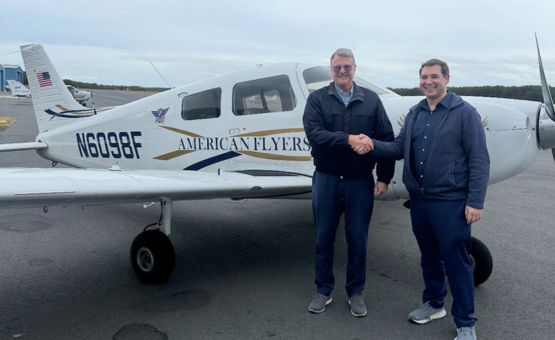When I spend time in the American Flyers flight schools or airline academy, I hear the phrase “Ambassadors of Aviation” a lot, and it’s directed at flight instructors.
Old joke: how do you know if there’s a pilot at a party? Oh, they’ll tell you. So, you better believe they’ll be telling the world that they are now the super-elite, the few, the proud, the best of the best, the flight instructor. So now that your local community, friends, and family, know that you have been sanctified with the FAA’s holy water and that you are an aviation teacher, what are they going to do with that information?
Who is that person going to call if they have a question about an introductory flight, or a nephew pursuing a career in aviation, or when Uncle Alton wants to rent a plane to fly to Door County, Wisconsin for the weekend? That’s right, Mr. or Ms. CFI… You! You are officially the village expert when it comes to aviation. Your new credentials have made you an authority. So, what responsibility do you have to your community?
Let’s review some FOI here. Let’s talk about professionalism. Now not everyone who poses a question to you is going to become a pilot or pass airline academy, or even start a learn-to-fly process, but again, you’re an aviation professional. You represent aviation. You are an example of aviation. You are an ambassador to aviation. So, you need to be prepared to start the teaching process at this moment. Answer their questions knowledgeably and sincerely. Know your material, and know when you’re out of your league, the latter being especially true for your students as well. This also means that you may need to step out of the current role that you are playing and step into the role of being a CFI. If you are out after hours at a local pub-enjoying a beer and wearing your favorite heavy metal band shirt-and an aviation question comes up, what effect do your surroundings, your attire, behavior, the beer in your hand, have on your credibility? Granted, the information you communicate could be accurate, but the manner in which you’re presenting it could be a barrier to that communication, and it could call into question your professionalism.
Fair or not, your appearance and the manner with which you communicate has just as much to do with effective learning as does the material you are communicating. Think about what your neighbors are going to think about you and your role as an instructor if you are constantly driving way too fast in the neighborhood and never wearing your seatbelt… what does that behavior say about aviation? Professionalism starts long before you impart knowledge to a student, and sometimes even before you even begin planning for the lesson. It starts with an image and a degree of self-respect. It’s wardrobe choice, hygiene, the style of your hair, where you park your car for the lesson… the list goes on. A big goal of professionalism is to not distract your customer-your student-from anything else around them, including you, so your physical appearance should be standard and not distracting. Example: a full-length sleeve tattoo is certainly your right, but it may be distracting to the preacher’s wife who is your student. And that’s what her focus now becomes, not what you are teaching her. So wear a long sleeve shirt.
How do you mitigate distracting your students? Be a professional. Be an ambassador of aviation. Exemplify what they feel is professional. How would a middle-aged business person expect a professional to dress? Probably a shirt and tie, or at least business casual. How would a teenager expect you to dress? Might be a different answer, but how would his or her parents expect you to dress? To act? Remember that your appearance can also command respect, so apply this to working with a younger student. Or, apply this to YOU being the younger person and your student is significantly older than you, and a successful attorney; how are you going to alter your behavior and/or appearance to bridge this gap? Okay, would this same approach probably work with anyone? I’ll bet it would. Always err on the side of being more professional.
As an ambassador to aviation, you always have to be prepared to represent your industry with accuracy and intelligence for the topic, with proper judgment, ethics, and sincerity. It will make you a better teacher, which will make your students better pilots after they complete airline academy.










